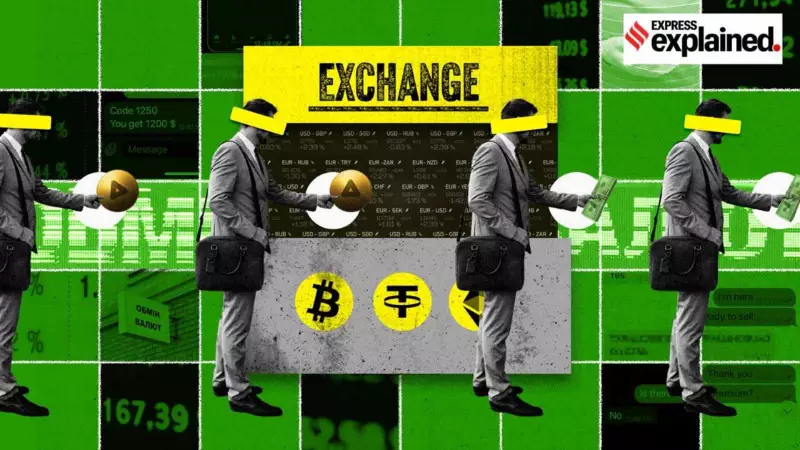
India's cryptocurrency market is experiencing unprecedented growth, reaching a valuation of $2.6 billion in 2024 with projections indicating it could soar to $15 billion by 2035. This explosive expansion comes despite the absence of comprehensive regulatory frameworks and ongoing concerns from financial authorities about the risks involved.
The Booming Indian Crypto Landscape
With an estimated 119 million users, India has established itself as one of the world's largest cryptocurrency markets. According to consulting firm IMARC Group, the market achieved a $2.6 billion valuation in 2024, while investment advisory firm HDFCTru predicts this figure will climb to $15 billion by 2035, representing a Compound Annual Growth Rate exceeding 17% over the next decade.
A revealing study by Indian crypto exchange CoinSwitch shows that Generation Z investors, aged 18-25, now lead India's crypto adoption with 37.6% representation, slightly edging out Millennials (26-35 years) at 37.3%. The 36-45 age group accounts for 17.8% of investors, based on data from 2.5 crore platform users analyzed in the third quarter of 2025.
Geographic Distribution and Regulatory Challenges
While metropolitan centers continue to dominate crypto trading activity, with Delhi leading at 19.3%, followed by Bengaluru (8.9%) and Mumbai (7%), emerging hubs are rapidly developing across the country. Cities including Jaipur, Lucknow, and Patna are showing significant adoption rates, indicating the nationwide spread of cryptocurrency interest.
The sector operates in a regulatory gray area. Trading cryptocurrencies isn't illegal in India, but they lack recognition as legal tender, restricting their primary use to investment instruments. The absence of central legislation creates policy uncertainty for industry players and offers minimal safety protections for users.
Understanding Cryptocurrency Fundamentals
Cryptocurrencies represent digital assets built on blockchain technology, which functions as a decentralized online ledger that securely and transparently records transactions. Unlike traditional currencies regulated by governments, major cryptocurrencies like Bitcoin and Ethereum operate without central oversight. Their value fluctuates based on supply, demand, and market sentiment, resulting in significant volatility.
Crypto exchanges serve as online platforms enabling users to buy, sell, and trade digital tokens. These platforms, including prominent Indian exchanges like CoinSwitch, Zebpay, and WazirX, along with global giants Binance and Coinbase, facilitate currency conversion between rupees and cryptocurrencies while providing digital wallet storage services.
RBI Concerns and Global Regulatory Approaches
The Reserve Bank of India maintains strong opposition to crypto assets, viewing them as threats to financial stability and monetary control. The central bank argues that these highly speculative assets could expose investors to substantial losses and potentially undermine the rupee's sovereignty. In its December Financial Stability Report, the RBI cited International Monetary Fund research indicating that widespread crypto adoption could reduce monetary policy effectiveness, worsen fiscal risks, and enable money laundering activities.
Globally, regulatory approaches vary significantly. The European Securities and Markets Authority has implemented the Markets in Crypto-Assets Regulation, providing a unified legal framework. The United States employs multiple regulatory agencies, including the Securities and Exchange Commission and Commodity Futures Trading Commission, to oversee digital assets. The recently introduced GENIUS Act focuses specifically on stablecoin regulation. Meanwhile, countries like China maintain near-total bans on cryptocurrency trading and mining.
Investment Risks and Security Concerns
The cryptocurrency investment landscape differs fundamentally from traditional options like mutual funds. While India's equity-oriented mutual funds managed over $390 billion in assets as of October 31, crypto investments remain unregulated and lack government-backed investor protection, making them vulnerable to extreme price volatility.
Security threats persist as scammers employ various tactics, including fake websites mimicking legitimate exchanges, "pump and dump" schemes that artificially inflate coin prices, and phishing attacks targeting private wallet keys. Experts recommend thorough research and using regulated, reputable exchanges that follow strict Know Your Customer and Anti-Money Laundering protocols.
For those venturing into cryptocurrency investments, security measures including strong passwords, two-factor authentication, and cold wallet storage for offline asset protection are essential. Financial professionals advise diversifying portfolios, avoiding "get-rich-quick" schemes, and exercising caution with unknown tokens promising unusually high returns.





